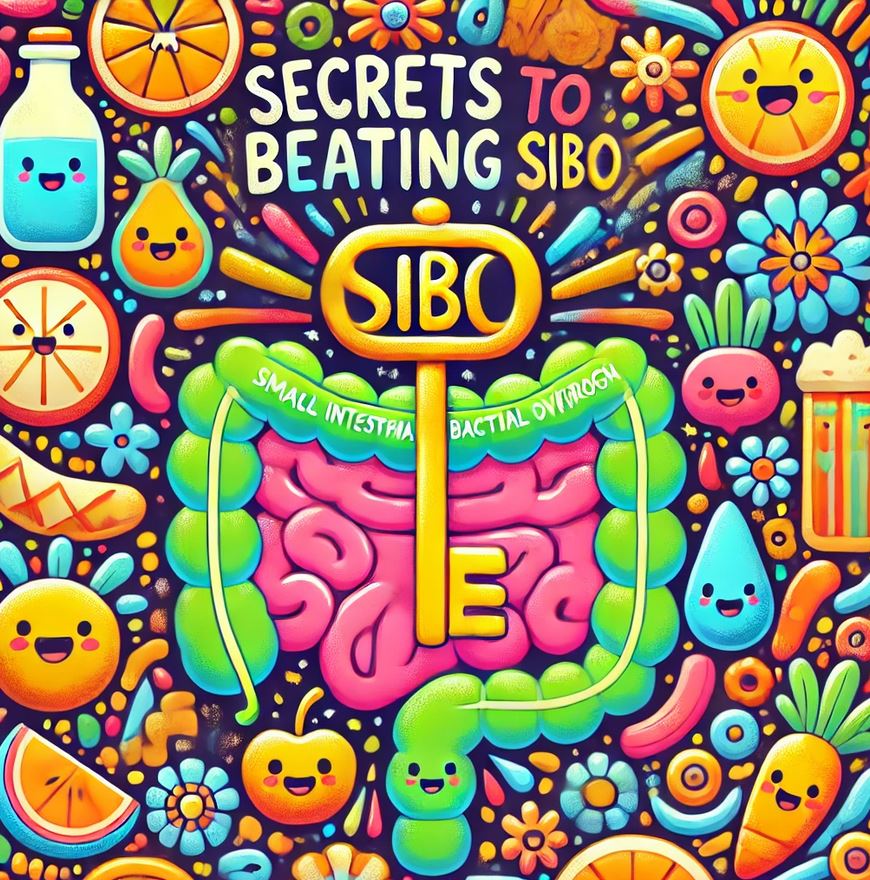17 Secrets to Beating SIBO Symptoms
 Many people have SIBO, but very few know how to beat it. Searching for answers, they try antibiotics, natural antimicrobials, and carnivore diets, but the benefits rarely last. The reason is, SIBO is far more complex than most people think. It is caused not only by a pathogen but also by a dysfunctional immune response.
Many people have SIBO, but very few know how to beat it. Searching for answers, they try antibiotics, natural antimicrobials, and carnivore diets, but the benefits rarely last. The reason is, SIBO is far more complex than most people think. It is caused not only by a pathogen but also by a dysfunctional immune response.
In this article, I will uncover the secrets to overcoming SIBO. The only catch is, many of these tips require you to change to see the benefits. Though these changes may seem intimidating, they are worth the results. Ready to get started? Take a look below.
Secrets to Beating SIBO Symptoms
Reduce Amount of Meat/Animal Products
The most common dietary mistake for those with SIBO is eating too many animal products. This is typically meat, but it can be other things as well. Unfortunately, animal products are much harder to break down than plants, and when the stomach becomes compromised, this can lead to issues. These undigested foods disrupt the environment and make it easy for unfriendly bacteria to take advantage.
The key to stabilizing bacteria is improving your response to high-fiber foods. It may take some time, but it’s very easily achieved. This will give your good bacteria the opportunity to replicate and stabilize your gut. By continuing to eat meat, it will encourage the growth of the bacteria responsible for producing your SIBO symptoms. If your situation is bad enough, you may not be able to beat chronic SIBO until you eliminate meat. Though this may sound odd, I have seen this on several occasions. After the person then removed meat, they overcame the healing plateau.
Implement Plant-Based Elimination Diet
The plant elimination diet helps you identify which foods agree with your immune system and which do not. People with SIBO have hidden food sensitivities that drive many of their symptoms. To be able to overcome this condition, you must become aware of the foods that are causing your flare-ups. I accomplish this with clients by creating a weekly dietary/symptom log and then we go over the reasons for the flare-ups on the calls. To learn more about how to implement a plant-based elimination diet, read the link rovided.
Slim Down on the Supplements Immediately
People who have SIBO are often taking way too many supplements. Even though they have good intentions, many of these supplements may alter the gut microbiome negatively. In addition, some of them are concentrated forms of nutrients which can feed pathogenic bacteria. When overcoming SIBO, you need to be VERY conservative with your supplements. If they are not calming down the immune system and making the good bacteria grow, they are a risk. Trust me, less is more when you’re overcoming SIBO. NEVER throw a bunch of supplements at the wall in an attempt to kill SIBO. This approach will come back to bite you.
Choose your Probiotics Wisely
There are countless probiotics out there, but only a few that are worth the money. My favorite are probiota bifido by Seeking Health, lactobacillus rhamnosus and epic pro from Swanson. Keep in mind, though probiotics can be important, they are less important than prebiotics are. Because of this, I would put most of my efforts there and stick with minimal probiotics.
Gradually Increase Plant Fiber
People who typically have SIBO are eating way too much meat. Because of this, they cannot break down complex fibers very well. This is essential to overcoming the immune dysfunction in the gut. For this reason, it is important to gradually introduce more plant fiber to get the body used to it. As it starts to tolerate plant fiber, you will know that your bacterial balances are starting to normalize again. The more fiber you then eat, the more fuel those bacteria will have to take control of your gut.
Use Prebiotics to Stabilize Gut
Prebiotics are more important than probiotics because they feed a more diverse range of bacteria. My favorite prebiotics are inulin, acacia senegal, arabinogalactan, bee propolis, wolfberry extract and cocoa powder. These have all been game changers because they selectively enhance the growth of beneficial bacteria, while discouraging the growth of pathogenic organisms. To learn more about prebiotics, read my article: 22 Best Prebiotic Supplements for Gut Health.
Avoid Simple Sugars or Excess Carbs
If you are eating plant-based, you need to be less concerned about carbohydrates than someone who is eating meat. Ideally, you want to consume complex carbohydrates, not fast acting sugars like juices, junk food, bread, etc. Your goal should never be to limit carbs, but rather to consume the right type of carbs. Your body NEEDS glucose to operate correctly, especially when you reduce the animal products in your diet. Keep in mind, the more fiber you have, the less you need to be concerned about carbs. This is because the fiber slows down the release of the sugar so their is no spike.
Limit Portions- Never Eat Until You Are Full
Your main enemy when battling SIBO is undigested food. The last thing you want is to eat too much food at a meal because that increases the chances that some of it may not be digested properly. This is why you need to have smaller meals, and eat slower to make sure this does not happen. The goal is NOT to be full, it is to not be hungry. Though this may sound difficult to adjust to, it becomes much easier once you adopt a plant-based diet.
Use Raw Colostrum to Heal Gut
Raw colostrum made a massive difference for me when I had SIBO. It truly cannot compare to any other supplement out there when it comes to healing the gut. It may seem difficult to locate it, but it is possible. Here is a video, and an article discussing some tips for finding it.
Try Other Safe Natural Antimicrobials
After you have tried everything else I listed on this page, then you can start antimicrobials. The key point is, you MUST choose antimicrobials that are also immune modulators. This will make sure you don’t aggravate the immune system while attempting to remove a pathogen. My favorite natural antimicrobials are bee propolis, berberine, olive leaf extract, and Japanese knotweed.
Use Phytonutrients to Boost Good Bacteria
Things like cocoa powder, resveratrol, propolis, naringin, and grapeseed extract can modify the gut microbiome. Most of them do so by increasing the metabolic and replication rates of these beneficial bacteria. Though most do not consider them prebiotics, in my opinion, they are some of the best. Not only do they enhance the activity of the good bacteria, but they calm down mast cells, and plenty more.
Consume More Alkaline than Acidic Foods
The bad bacteria responsible for SIBO symptoms thrive in acidic environments. The acidosis causes the immune system to be chronically overactive and discourages the growth of beneficial bacteria. To rebalance your gut, you must focus on consuming more foods that are alkaline. These are vegetables, fruits, and most other plants. Acidic foods are things like starches, meat/animal products, junk food, etc.. By gradually eating more alkaline foods, your immune balance will restabilize, keeping you from experiencing symptoms.
Make Sure Mold is Not an Issue
It may sound crazy, but mold is often implicated in SIBO cases. The reason is, mycotoxin exposure can cause a severe disruption to the gut. It does so by triggering your immune system, and impairing your ability to breakdown proteins in foods. This leads to food sensitivities and various other issues. If you think there is any chance there may be mold in the place you were living, it is time to investigate further. My first step was doing a petri dish test because it was cheap. Learn more about it via the link provided.
Stop Eating Three Hours Before Bed
The last thing you want to have is food rotting in your stomach. This can happen if you eat close to bedtime. When you fall asleep, your digestive system turns off for the most part, and any food that’s in there will NOT be fully broken down. This is why stopping eating three hours before bed is so important. If the food is digested before you go to sleep, you will not risk aggravating the gut lining by having it sit in your stomach overnight.
Less Ingredients at Each Meal
In SIBO, the gut is clearly compromised. With this in mind, you don’t want to consume meals with too many ingredients. This will cause stress on your digestive system, and the undigested food will cause harmful bacteria to propagate. Instead, choose simple meals, like beans, broccoli, and cauliflower with olive oil and salt. Keep it simple like this stops the digestive system from going into shock. My typical rule is five ingredients or less. If you want recipes ideas for breakfast, lunch or dinner, click on the links. There are well over 500+, and they are both plant-based and hypoallergenic.
Chew Food Very Well and Eat Slowly
The more deliberate you are about chewing your food well, the less stress you put on your gut. Though it sounds basic, it is important to pay attention to this when you are eating. In addition, if you eat too fast, you are likely to activate pathogenic bacteria. If they have a sudden spike of sugars/fat/protein, they can come out of hiding. If you consume your food gradually over a longer period of time, AND chew extremely well, the chance of this decreases. Ultimately, the last thing you want is undigested food because that is exactly what pathogens love. Want to know where to start? When chewing, just count to twenty before you swallow, and take a break in between bites. Though these are small changes, they can make a big difference.
Try Slow Deep Breathing before Meals
People who have SIBO often are in a state of fight or flight. This makes the digestive system function improperly. When stressed, the body will push food through the digestive tract quicker than it should. This leads to undigested food particles and problems in the large intestine. If you implement something like slow deep breathing, it can help you exit that state of fight or flight before you consume the food. This will lead to better digestion since it will slow down the motion of the food through your small intestine.
Frequently Asked Questions – Beating SIBO naturally
Why is meat bad for SIBO?
There are several reasons, but the most important one is, it usually isn’t digested well. When meat rots in the stomach, it releases various inflammatory compounds, encouraging harmful bacteria to flourish. Studies have shown that in most cases, the bacteria fed by animal products are the same ones that cause autoimmune diseases and other chronic inflammatory issues.
What if I can’t tolerate fiber well?
To beat SIBO symptoms in the long term, you MUST be able to tolerate fiber. If you can’t handle fiber at the moment, just increase it slowly. You can start with steamed vegetables, pears, apples, and anything else that works for you. Once you get used to it, gradually increase the fibrous foods while simultaneously decreasing animal products/processed foods. The goal is to eat primarily plants, and keep your blood sugar stable from the fiber rather than the protein and fat. This will be healthier for the gut, liver, and immune system.
Which antimicrobials are best for SIBO?
Raw bovine colostrum, or fermented colostrum, is the BEST product for SIBO. I had several bacterial infections and systemic candidiasis, and nothing was able to reduce the symptoms like colostrum. Other antimicrobials are bee propolis, berberine, black seed oil, and japanese knotweed root. Though they can be useful, I only resort to them once we have done everything else.
And SIBO actually caused by a parasite?
When people have resistant SIBO, it’s often because there is something else that is causing the gut to be impaired. One of the most common causes is protozoans. These nasty parasites can dramatically disrupt the gut microbiome, which can allow SIBO to become a problem. This is why it is so important to avoid taking antimicrobials until you have made all of the other changes I mentioned above. You don’t want to target a bacteria when it is, in fact, something else.
How long does it take to recover from SIBO?
That is a tough question to answer. It can take six months or six years, depending on the person. The most important factors are their diet, the supplements they are taking, if there is mold in the home, etc. The most important thing to do is identify what is triggering the SIBO symptoms to appear and then make changes. This approach will save you the most time in the long run.
Should I use antibiotics to get rid of SIBO?
In my experience, it’s like rolling the dice. Though I can’t advise against antibiotics, what I can say is if it doesn’t work, things could become a lot worse. Often SIBO develops as a result of too many antibiotics being used. Their use alters the gut microbiome which allows these bad bacteria to flourish. Also, many times, SIBO is actually being caused by a protozoan parasite. In that case, you will not be able to eliminate it with antibiotics. This is why targeting the immune system through the methods mentioned is so important.
Beating SIBO the Smart Way
Hopefully, after reading this article, you will see that eradicating SIBO isn’t simply about destroying the pathogen. It is about changing the environment within the gut and calming the immune system down. If you take the seek-and-destroy approach, you risk disrupting the environment even further, which can make SIBO even harder to overcome.
Take it for me, I struggled with several different bacterial overgrowths for over a decade. Once I made the changes listed in this article, my symptoms gradually disappeared. Treat SIBO like a digestive insufficiency and immune dysfunction, not a pathogenic issue. This will allow you to approach it in the proper manner so that you can overcome it once and for all.
If you are experiencing SIBO or other similar symptoms, feel free to reach out. I have plenty of experience in gut health.
Happy healing everyone!
Matt Nedin, B.S.
Certified Holistic Nutritionist
EndSickness, Founder
Phone: (734) 846-8619
WhatsApp: +17348468619
Email: endsickness@gmail.com







